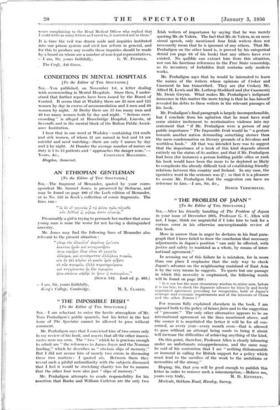Sin,—After his friendly handling of The Problem of Japan in
your issue of December 20th, Professor G. C. Allen will not, I hope, think me ungrateful if I take him to task for a curious error in his otherwise unexceptionable review of this book.
More in sorrow than in anger he declares in his final para- graph that I have failed to draw the conclusion that necessary adjustments in Japan's position "can only be effected, with justice and safety to mankind as a whole, by means of inter- national agreement."
In accusing me of this failure he is mistaken, for in more than one place I emphasise that the only way to check Japan's advance on the neighbouring mainland of East Asia is by the very means he suggests. To quote but one passage in which this necessity is emphasised, the following words will be found on page 269:
"Is it not but the most elementary wisdom to strive now, before it is too late, to check the Japanese advance by friendly and freely negotiated agreement providing for recognition, both of Japan's strategic and economic requirements and of the interests of China and the other Powers ?
For reasons fully explained elsewhere in the book, I am opposed both to the policy of laissez faire and to the suggestion of "pressure." The only other alternative appears to be an international agreement on the lines mentioned above, and the sooner it is negotiated the better it will be for all con- cerned, as every year—every month even—that is allowed to pass without an attempt being made to bring it about will increase the difficulties of achieving anything of the kind,
On this point, therefore, Professor Allen is clearly labouring under an unfortunate misapprehension, and the same may be said of his contention that I see "nothing dishonourable or immoral in calling for British support for a policy which must lead to the sacrifice of the weak to the ambitions or necessities of the strong."
Hoping, Sir, that you will be good enough to publish this letter in order to remove such a misconception,—Believe me,










































 Previous page
Previous page